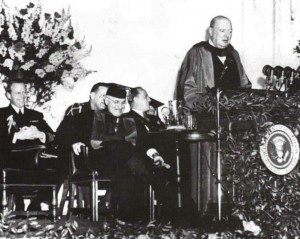Russia: Back to the Future
By Patrick W. Ryan
This week the drama that is the Russian invasion of its neighbor, Ukraine, unfolded to reveal the character of strongman Vladimir Putin and to sound a wakeup call to the West that it is back to the future in the relationship with Moscow. The calendar also offered no shortage of historical irony. This week 68 years ago Winston Churchill, fresh from being turned out of office as British Prime Minister, traveled by train with President Harry Truman to tiny Fulton, Missouri. Churchill was invited to receive an honorary degree from Westminster College but the occasion is best remembered for a speech that echoes down through the years.
 “The Sinews of Peace” by Churchill, the champion of Western steadfastness against Nazi Germany domination, rendered a frank assessment of the post-World War II landscape. He offered understanding and a hand of friendship, “deep sympathy and goodwill,” to the people of Russia who had suffered much more trauma in the war than her allies and acknowledgement of the “Russian need to be secure on her western frontiers by the removal of all possibility of German aggression.” However, he used the speech to sound the alarm over Russian domination of Eastern Europe and the apparent “expansive and proselytizing tendencies” of the Communist international organization.
“The Sinews of Peace” by Churchill, the champion of Western steadfastness against Nazi Germany domination, rendered a frank assessment of the post-World War II landscape. He offered understanding and a hand of friendship, “deep sympathy and goodwill,” to the people of Russia who had suffered much more trauma in the war than her allies and acknowledgement of the “Russian need to be secure on her western frontiers by the removal of all possibility of German aggression.” However, he used the speech to sound the alarm over Russian domination of Eastern Europe and the apparent “expansive and proselytizing tendencies” of the Communist international organization.
The words he etched in history focused on the latter, “From Stettin in the Baltic to Trieste in the Adriatic, an iron curtain has descended across the Continent. Behind that line lie all the capitals of the ancient states of Central and Eastern Europe. Warsaw, Berlin, Prague, Vienna, Budapest, Belgrade, Bucharest and Sofia, all these famous cities and the populations around them lie in what I must call the Soviet sphere, and all are subject in one form or another, not only to Soviet influence but to a very high and, in many cases, increasing measure of control from Moscow.”
Churchill not only sounded the alarm, he also called for measures to confront the challenge. Using an allegorical “Temple of Peace” he called for the “workmen from all countries” to join together. They must, he said, “share their tools” to “increase each other’s working powers.” Churchill warned about failure to build such a coalition, “Indeed they must do so or else the temple may not be built, or, being built, it may collapse, and we shall all be proved again unteachable and have to go and try to learn again for a third time in a school of war, incomparably more rigorous than that from which we have just been released.”
The clarion call to stand against the looming threat was British, but the leadership in mounting a 45-year defense against the Moscow-centered Soviet threat was American. Over that span the United States demonstrated a relentless bi-partisan commitment to the effort. The North Atlantic Treaty Organization, a multi-lateral defense pact, was formed as the principal mechanism to check the Soviet expansion, which had already consumed Eastern Europe. Americans unflinchingly invested their blood and treasure to the enterprise because it was in American interests to do so.
As scholar and diplomat Aaron David Miller said this week, these things are “not a short movie.” America staked its credibility to lead and in the case of the Cold War it succeeded. In the current case Russia, in the short term, will prevail. Reversal of Putin’s imperial move to consume Crimea and threaten the rest of Ukraine and, by extension, other former Soviet states, is not within the realm of practical short term outcomes. “Geography is destiny,” says Miller and the Ukraine and the West have been dealt a bad hand in this crisis. Putin moved because it was in his interest and he could get away with it. For now.
Is the “Cold War” analogy with the Ukraine crisis airtight? No, it is not. The world is a different place. Ideology is less a factor in East-West tension. America confronts not just a resurgent Russia on the world’s stage but is also watching and responding to the worrisome expansion of Chinese power. The globalized economy binding the players is as much a determinant of interests as the political-military scenarios. The cooperation between Washington and Moscow was seen as a key to unraveling the many messes unfolding in the Middle East. In short, the world is more complicated. But Churchill’s warnings of German expansion reach out to us from the threat that was building in the 1930s, “Last time I saw it all coming and cried aloud to my own fellow-countrymen and to the world, but no one paid any attention.”
What is analogous today with the “Sinews of Peace?” America is a country weary of war and somewhat disdainful of foreign involvements. But as former Secretary of State Madeleine Albright said of the “indispensible nation,” America, “We stand tall and we see further than other countries into the future, and we see the danger here to all of us.”
Some people say we cannot afford to be a leader in doing these things. Others who have learned from history would say we cannot afford not to.
Published in the Sunday, March 9, 2014 Herald-Citizen, Cookeville, Tennessee.
